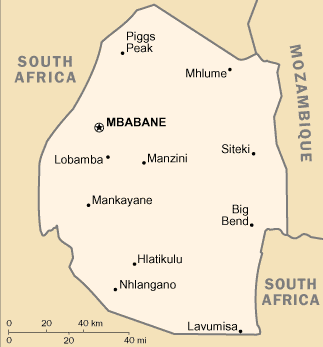Mbabane, Swaziland
March 14, 2007
 Source:
IRIN News Source:
IRIN News
In anticipation of what could be the
worst food shortage in 25 years brought on by prolonged dry
weather, the price of Swaziland's staple food, maize, has risen
by 80 percent in the past month, and is expected to double by
harvest time in April-May.
Since the rains stopped falling in mid-January, the price of a
metric tonne of maize has escalated from just below US$168 to
$307.55, and is expected to climb to more than $330 by the end
of March.
"Variation in weather patterns have seriously affected maize
crops at a very critical stage," said Ben Nsibandze, Director of
the National Disaster Relief Task Force, which advises
government and the international donor community on the status
of the country's food supply.
The task force was established in 1992, when the country
experienced its worst drought-induced food shortages. "The
current disaster will equal what was experienced 15 years ago,
when government set up the task force," said Nsibandze.
In the last few months, Swaziland has suffered delayed rainfall,
heavy winds and hailstorms, followed by scorching dry spells.
Usually only the dry Middleveld, Lowveld and Lubombo Plateau
areas are affected, but this year the entire country has
experienced poor growing conditions.
A food assessment will be undertaken next month by the United
Nations agencies, World Food Programme (WFP), Food and
Agricultural Organisation, and the local Vulnerability
Assessment Committee, to help to establish the impact of the dry
spells on the national food supply.
WFP has been supporting about a quarter of Swaziland's 1.1
million people with food assistance since 2002, to improve the
nutrition of families affected by drought, poverty and HIV/AIDS.
"The rains stopped just as the maize crops were reaching the
critical stage in their growth, where they develop tassels and
the cobs enlarge," said Charles Nkambule, an agricultural field
officer in the central industrial town of Manzini.
Because the Manzini region in the west produces most of the
country's maize, word of expected poor harvests on commercial
farms as well as small family-run plots caused a sharp increase
in the price.
 Nsibandze
said all areas of the country could expect maize supplies to run
out and eventually disappear from store shelves. "Widespread
food shortages will be experienced, particularly by the most
vulnerable communities," he told a press conference. Nsibandze
said all areas of the country could expect maize supplies to run
out and eventually disappear from store shelves. "Widespread
food shortages will be experienced, particularly by the most
vulnerable communities," he told a press conference.
Middle-class consumers, already hard-pressed by rising prices,
will have to switch to alternative grains, like rice, which is
imported and more expensive, or bread, baked from imported
wheat.
Communal farmers, who comprise 80 percent of the population, are
unlikely to salvage much of their crops from spring planting
during October and November. Late summer planting was not
undertaken because normal seasonal rain had ceased.
"The reliance on rain to feed a great majority of the population
has not changed since 1992; there has not been a real movement
toward irrigation, or moving people off land that cannot sustain
human life. A land management policy is required, but it is
lacking," said Nkambule.
An official in the ministry of agriculture, who did not wish to
be named, said capital was needed but also hard to come by, to
enable farmers to purchase irrigation pumps and pipes, even if
they formed cooperatives and pooled their small landholding
resources to do so.
"Banks have been unwilling to extend loans to farmers on Swazi
Nation Land because the residents don't own title deeds to their
fields. But there's been some movement toward granting these
loans, even to the majority on communal land," he said.
Swaziland's food security crisis has also been aggravated by the
diminishing agricultural labour pool as a result of the high
incidence of HIV - 33.4 percent of adults are infected.
Family farms have been particularly hard hit, and there are
often no longer any adult males to plant, weed and harvest. Men
working in towns as labourers, government bureaucrats or
white-colour workers customarily take time off to return to
rural homesteads to work the family fields, but AIDS has also
curtailed their ability to do so.
"I am the only able-bodied man in my family. I have to look
after my two brothers' fields, now - it's more than I can
handle," said Frank, a mechanist at the Matsapha industrial
estate, outside Manzini. "Last year, I hired some workers, but
the crops are so scarce this year, it's not worth it. The crows
will get what little is left." |
|